Revista Científica Arbitrada de la Fundación MenteClara @fundacionmenteclara
Статьи журнала - Revista Científica Arbitrada de la Fundación MenteClara
Все статьи: 199
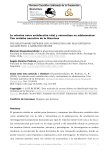
Статья научная
El presente estudio se realizó para destacar y comparar las diferentes variables tales como satisfacción con la vida y autoestima en la adolescencia. Se analizaron las investigaciones propuestas buscando que tipo de relación existe entre una y la otra y las consecuencias que tiene en la etapa juvenil o del desarrollo donde se producen los cambios físicos, emocionales, sociales y psicológicos. La investigación se realizó mediante la recolección de datos derivados de una búsqueda académica, donde se puede conocer y dar respuesta o explicación a este interrogante. Se observa entonces, una relación positiva entre los niveles de autoestima y la satisfacción vital en la adolescencia, indicando que una autoestima elevada contribuye al bienestar subjetivo en esta etapa del desarrollo. Comprender estos hallazgos puede contribuir al diseño de intervenciones psicológicas y educativas con el objetivo de fortalecer la autoestima como estrategia para mejorar la calidad de vida de los adolescentes.
Бесплатно
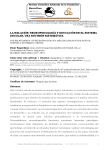
La relación: neuropsicología y educación en el sistema escolar, una revisión sistemática
Статья научная
Este estudio, aborda la relación neuropsicología y educación, en contextos educativos escolares, a partir de artículos científicos. El Objetivo de este trabajo ha sido analizar publicaciones que aborden la temática de la neuropsicología en el ámbito educativo. Resultados: Se incluyen 12 artículos que aportan investigaciones y producción académica incorporando la disciplina en sus trabajos de manera directa o en relación a temas a fines. Discusión: la neuropsicología de la educación es el estudio del cerebro en desarrollo y su relación con el comportamiento del estudiante. Los artículos revisados, la sitúan para referirse principalmente a la neuroeducación; Neurodidáctica; neurodesarrollo; funciones ejecutivas; bienestar psicológico. Conclusiones: Esta disciplina, ha facilitado el conocimiento neurocientífico del aprendizaje, permitiendo al educador diseñar estrategias y aplicar metodologías que potencien las características individuales de los estudiantes en las aulas, haciendo de ellas, un espacio más favorable para la inclusión, que valora la individualidad y la diversidad, acorde a la presencia o no de alteraciones relacionadas con el aprendizaje. La información teórica y los elementos empíricos contribuyen a diseñar proyectos de mejoramiento educativo, y son una oportunidad para conocer a la persona del estudiante desde la perspectiva neuropsicológica y mejorar las formas de actuar del propio sistema escolar.
Бесплатно
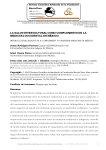
La salud intercultural como complemento de la medicina occidental en México
Статья научная
El objetivo del presente trabajo es analizar los factores que han provocado la falta de complementariedad entre la medicina tradicional y la occidental, para coadyuvar a enriquecer y alentar la interacción y comprensión entre estas dos importantes áreas del conocimiento médico. Se llevó a cabo una revisión bibliográfica y documental sobre aspectos de salud intercultural en general y en particular en México. La salud intercultural es el resultado de la complementariedad del sistema de salud occidental y tradicional milenario de los pueblos y comunidades indígenas y afro mexicanas. Se requiere de una mayor interacción entre la medicina occidental e indígena y unos de los factores que frenan la complementariedad son la comunicación, reconocimiento de la diversidad lingüística y la falta de capacitación de los profesionales de salud que inciden en la atención a la salud en estas comunidades marginadas. Se tiene que seguir alentando la interacción entre estas dos importantes áreas del conocimiento médico en México.
Бесплатно
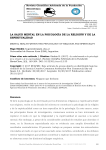
La salud mental en la psicología de la religión y de la espiritualidad
Статья научная
Si bien la psicología se ha interesado por los fenómenos religiosos y espirituales desde sus origines, recién en la década del ochenta se constituye la psicología de la religión y de la espiritualidad como un área específica de la psicología. En este marco, entre las principales líneas de investigación, numerosos autores se han interesado en explorar el modo en que la religiosidad y la espiritualidad se asocian a la salud mental. Sin embargo, a pesar de la considerable cantidad de estudios que abordan el tema, en la literatura especializada aún se evidencia una amplia diversidad de resultados contradictorios. El presente trabajo se propone revisar los antecedentes vinculados al modo en que se han asociado estas variables, atendiendo a los debates teórico-epistemológicos que podrían contribuir a explicar las enormes diferencias que se observan entre los distintos hallazgos empíricos.
Бесплатно
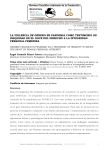
Статья научная
Esta investigación fue realizada con la intención de constituir un aporte académico para evidenciar la inequidad en la protección de los derechos de la mujer en el contexto de la pandemia por COVID-19. Con este trabajo se pretendió analizar el aumento de la violencia de género en pandemia como testimonio de la desigualdad en el goce femenino del derecho a la integridad personal. Para ello, se estructuró un proceso investigativo cualitativo con diseño documental, e interpretación de textos a través de la hermenéutica, y con ello se determinó que existe un incremento en las agresiones físicas y psicológicas hacia las mujeres como consecuencia de factores de estrés, entre otros, en quienes conviven en aislamiento. Los hallazgos realizados fueron importantes para determinar que reforzar la cultura del empoderamiento es crucial para que las féminas asuman sus prerrogativas y deberes, de manera que sepan afrontar futuros escenarios de emergencia que pudieran experimentar.
Бесплатно
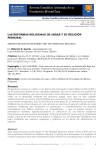
Las reformas religiosas de Akbar y su religión personal
Статья научная
El siguiente ensayo se enfoca en la figura del emperador mogol Akbar (1542-1605) y en la motivación detrás de sus reformas religiosas. En este se debaten los análisis de algunos historiadores que han interpretado estas reformas como el resultado de un viraje en la identidad religiosa del monarca mogol, pero que no han tomado suficientemente en cuenta la parcialidad que caracteriza a los cronistas de su época, cuyas obras constituyen una de las fuentes principales de la historia de ese periodo. A diferencia de otros trabajos, en este artículo se acentúa el carácter político de estas reformas religiosas que facilitaron al emperador el establecimiento de alianzas estratégicas con líderes políticos no musulmanes, y que al mismo tiempo le permitieron debilitar significativamente la influencia de los líderes religiosos musulmanes en los asuntos del Estado. Esta interpretación revela que el emperador mogol, lejos de ser un mero actor político o religioso, fue un estratega inteligente que logró equilibrar los asuntos religiosos y políticos en su forma de administrar el imperio.
Бесплатно
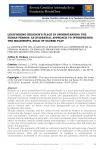
Статья научная
Religion on a more institutional level and spirituality in a more personally existential way is not a respecter of socio-economic status, limited to whether or not a country is developed, or fickle about where it takes root geographically. Even the “New Atheism” movement complies with pseudo-doctrines, proves zealous for deeply-rooted beliefs, and has even started meeting in what are called atheist “mega-churches.” It would seem that human beings are inclined to the phenomenon of organized religion and/or “sacred play” no matter what their backgrounds are or what historical localization they claim. Though religion, theology, and the claims therein should be weighty in discussions concerning the human person, often these sciences are dismissed as secondary or even unnecessary. However, more are admitting that to understand mankind in general and the individual in particular, one must incorporate what these discussions afford. As Haslina Ibrahim (2008) rightly acknowledges, “to fully understand man, it is vital that we reconcile the study of religions with other sciences that fall under the study of humanities.” To this end, this argument will build an evidential case for the pervasiveness of sacred play and call readers to understand something of its legitimacy in discussions of the human person. This will be accomplished by building a compendium of characteristics witnessed in the human person that are generally observed among social scientists and then connecting these both individually and collectively to the phenomenon of sacred play.
Бесплатно
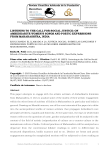
Статья научная
This paper attempts to engage with the artistic activism of Ambedkarite feminists from Maharashtra. It tries to analyze some of the modes of their artistic engagement within the other forms of activism of Dalits in Maharashtra in particular and India in general. Drawing on Marathi sources, one of the core interests of the paper is to delve into the social-political worlds of women activists that propagate Ambedkar’s core principles of liberty, equality and fraternity. At the same time, the ways in which Dalit women reflect on the questions of caste, gender and patriarchy will be analyzed in the context of the field of artistic (re)production of culture as a counter culture to the mainstream culture of India. Cultural practices of Maharashtra will be analyzed as a departure from the conventional folklore readings in order to differentiate its structured dispositions, bodily nuances and so on. Distinct art forms and poetic engagements among the marginalized sections will be subjected to close reading as well, especially the genres of Ovi, Powadas, Jalasa, Buddhageet and Bheemgeet. It thus turned into the weapons of the Dalits to unleash their political tirade against the Brahmanic culture. Hence it creates spaces for ontological and epistemic investigations within the rubric of Dalit culture. Thus, the primary and secondary sources and narratives will be deployed while researching artistic activism of Ambedkarite women in the context of songs and poetic expressions. This paper tries to explore the artistic activism of Ambedkarite feminists from Maharashtra.
Бесплатно
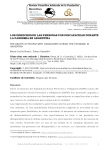
Los derechos de las Personas con Discapacidad durante la Pandemia en Argentina
Статья научная
Tanto el momento del Aislamiento Social Preventivo y Obligatorio (ASPO) cuanto del Distanciamiento Social Preventivo y Obligatorio (DISPO) han provocado angustia y ansiedad en las personas con discapacidad, especialmente en aquellos niños y niñas que carecen de condiciones para comprender la realidad. Las exigencias de los cuidadores, quienes han sido los que absorben y contienen todo este malestar, se han manifestado fehacientemente exigiendo la necesidad de una respuesta para flexibilizar, de modo controlado, la situación de aislamiento inicial y de distanciamiento posterior. Las repercusiones en torno a las personas con discapacidad durante ambas instancias es la preocupación central de las autoras de este escrito. Haciendo foco en una de las aristas de la compleja situación que atraviesan las personas con discapacidad y su entorno, en el presente artículo se analizará el modo en que se comunicaron las medidas de cuidado y prevención recomendadas para hacer frente a la pandemia. Se estudiaron las publicaciones en Facebook, Instagram y los sitios web oficiales del Ministerio de Salud de la Nación y del Ministerio de Salud de la Ciudad de Buenos Aires, comparando las estrategias de difusión y las características de la comunicación de las medidas de prevención destinadas a la población en cuestión.
Бесплатно
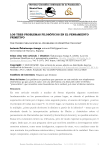
Los tres problemas filosóficos en el pensamiento primitivo
Статья научная
En este artículo estudio y analizo de forma tripartita algunas cuestiones fundamentales en los presocráticos: en primer lugar, se aborda el problema de superación del mito por el logos; como segundo punto, el asunto del origen: ¿cuál es el principio de todas las cosas? Y, en tercer lugar, se examina la cuestión de lo uno y lo múltiple: ¿cómo puede derivarse lo distinto a partir de lo idéntico? - tema que es abordado desde la interpretación polémica de Platón y Aristóteles sobre el pensamiento de Parménides (ser inmóvil) y Heráclito (el devenir) y su posible solución. Estas tres cuestiones tienen su relevancia, pero de modo especial la pregunta por el origen. Dado que, es una pregunta clave que nos lleva también a interrogarnos sobre nosotros mismos, como seres inteligentes, capaces de otear, ver y analizar como de una montaña los problemas existenciales y trascendentales de la realidad. Para una mejor compresión, empiezo con las cuestiones preliminares.
Бесплатно
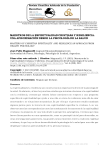
Статья научная
La espiritualidad y la resiliencia son constructos muy importantes dentro de la psicología de la salud. No obstante, si bien hay muchos estudios que intentan relacionar a la espiritualidad con la resiliencia, creemos que todavía faltan conexiones con respecto a una propuesta específica de espiritualidad que ayude a una vida en clave de resiliencia; más allá de estar atravesando o no situaciones traumáticas. Es por ello que el presente estudio examinará algunos puntos para la vivencia de una espiritualidad específica: la cristiana. A su vez, observaremos las correspondencias entre las enseñanzas de los maestros de la espiritualidad cristiana y la propuesta de una vida desde la perspectiva salutogénica. Creemos que estas breves líneas pueden ser una aproximación, como un puntapié inicial para desarrollar, en otras investigaciones posteriores, los grandes nexos existentes entre la tradición espiritual cristiana y lo que hoy en día se desarrolla desde la psicología de la salud para una vida que despliegue todas las potencialidades de la persona humana.
Бесплатно
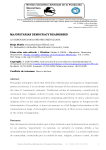
Majoritarian Democracy Reassessed
Статья научная
This paper attempts to show that while fear of democracy turning into a ‘majoritarian’ system is rational, it is not always realistic because of the inherent inconsistencies in the idea of ‘community cohesion’. Traditional notion of community, constituted by oneness of race, religion, culture or caste, has been seriously contested by upsurge of ‘salad bowl’ multicultural societies comprising assortment of races, cultures and religions. Even as the trajectories of modern democracies appear to foreground the ethnicisation of its politics, it does not amount to a full-fledged ethnicisation of the communities at large. A thoroughly united community, if there is one, looks real only in the realm of imagination.
Бесплатно
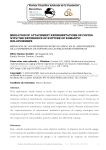
Статья научная
This exploratory study aimed to verify the impact of the attachment network on dealing with potential disruptive experiences. For this purpose, sought for possible relations between attachment representations and the experience of break-up of romantic relationships. Forty-four adults engaged in semi-structure interviews and questionnaires on attachment, coping and responses of grief. Results indicated that the representations of attachment mediated patterns of coping strategies and responses of grief. This study concluded that poor socio-emotional network increases the experience of vulnerability and the ability for effectively coping.
Бесплатно
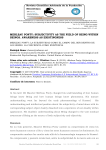
Merleau ponty: subjectivity as the field of being within beings. Awareness as existingness
Статья научная
In his later life Maurice Merleau Ponty changed his understanding of how human beings know Being and how human beings know phenomena. His mature understanding went far beyond the early phenomenology of Husserl. His understanding and intellectual position about the subjectivity of mind alone with its corresponding subject object duality dissolved into a experience of non duality within appearance. His dualistic understanding about Being changed to the vast nondual awareness of Being as the source of both subjectivity and objectivity.
Бесплатно
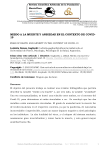
Miedo a la muerte y Ansiedad en el contexto de COVID-19
Статья научная
El objetivo del presente trabajo es realizar una revisión bibliográfica que permita describir la variable “miedo a la muerte” y, por otro lado, la variable “ansiedad”. Una vez conceptualizadas, se buscó una relación entre ambas, en el contexto del Covid-19, para determinar si están vinculadas o no. Se concluyó que las dos variables están sumamente vinculadas. El grado de ansiedad ante la muerte fue de tendencia alcista en el respectivo contexto, ya que la pandemia, de naturaleza incontrolable e impredecible, causó un mayor impacto negativo a nivel psicológico en los individuos. La alta letalidad del virus, y el colapso del sistema sanitario, ocasionaron gran incertidumbre y temor hacia la muerte, y esto generó mayor ansiedad hacia ella.
Бесплатно
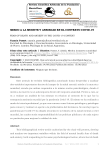
Miedo a la muerte y ansiedad en el contexto COVID-19
Статья научная
Este artículo de revisión bibliográfica autorizado busca desarrollar y analizar dos variables importantes dentro del campo de la salud mental: miedo a la muerte y ansiedad, siendo que ambas responden a la misma noción psicobiológica, donde el miedo a la muerte es un subconjunto dentro del conjunto ansiedad. Frente a esto, se va a realizar un análisis de las mismas en relacion al contexto de lo que fue la emergencia sanitaria mundial por la pandemia Covid-19. El mismo se ha realizado a modo de interés profesional, ya que nos convoca como futuros psicólogos y psicólogas para conocer y realizar un aporte a la problemática del fenómeno. Se concluyó que la pandemia por Covid-19 ha dejado secuelas en la historia de la salud mental a nivel mundial, las cuales serán responsabilidad de las políticas públicas y de cada sujeto en particular para mejorar la calidad de vida.
Бесплатно
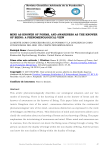
Mind As Knower of Forms, And Awareness as The Knower of Being: A Phenomenological View
Статья научная
This article phenomenologically describes our ontological situation and our two modes of knowing. There is the knowing of mind as the knower of forms and the knower of awareness as the knower of Being. This paper links and integrates the tantric Dzogchen view of the mind - awareness distinction within the continental phenomenological view of the mind- awareness distinction as expressed in the work of Heidegger and Merleau Ponty. This distinction of mind and awareness allows us to clarify the confusion about our knowing of forms and our knowing of Being. The paper emphasizes the intertwining of awareness and mind. When mind and awareness are in oneness, then the knower can know the Being-ness of being through a being. The person can know the duality of beings within the non duality of Being. And the person can know the non duality of Being within the duality of beings.
Бесплатно
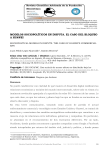
Modelos sociopolíticos en disputa. El caso del bloqueo a Huawei
Статья научная
No puede establecerse con claridad de qué manera el desarrollo digital moldeará las relaciones económicas y sociales del mundo interconectado, sobre todo en vistas a la inminente revolución aparejada a la aparición de redes 5G e internet de las cosas. Lo que está claro, es que los valores y pilares bajo los que se fundan se encuentran en abierta discusión y disputa. En esta breve comunicación, tomando como punto de partida el actual enfrentamiento comercial y tecnológico entre Estados Unidos y Huawei, se tratará de identificar y caracterizar dos modelos sociopolíticos enfrentados que resuelven a su manera el eje de relaciones entre individuos, gobiernos y compañías. En particular, se ahondará en el reconocimiento de dos escenarios diferentes. Por un lado, Occidente, donde pueden encontrarse a grandes compañías como Google y Facebook siendo interpeladas por actores del ámbito civil, judicial y político, y donde pesan importantes acusaciones de competencia desleal y manipulación de datos privados; y, por otro lado, China, donde las autoridades «protegen» a sus 800 millones de internautas para la explotación de unas pocas compañías en lo que puede entenderse como un peligroso modelo de integración vertical.
Бесплатно
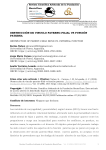
Obstrucción de vinculo paterno-filial vs función paterna
Статья научная
Las variables de conyugalidad y parentalidad, según Linares (2010), tienen una fuerte influencia en el ambiente relacional familiar, afectando tanto la personalidad como la salud mental de hijos y padres. Sin embargo, cuando el desamor aparece entre los progenitores y surge una incapacidad para resolver los conflictos, se produce, en muchos casos, la separación o el divorcio. El objetivo principal del presente trabajo ha sido conocer sobre los aspectos de la función paterna que se ponen en juego en la obstrucción del vínculo paterno-filial. Estos nuevos padres, no aceptan el rol histórico de proveedores que los desliga del mundo afectivo de sus hijos, y no están dispuestos a dejar de lado sus emociones y sentimientos, colocando a sus hijos en el centro de sus vidas, y son ellos quienes los completan y le dan sentido a su existencia, y ante el impedimento de poder cumplir su función paterna, emociones negativas y desadaptativas se hacen presentes en sus vidas, desarrollando el llamado Síndrome del Padre Destruido.
Бесплатно
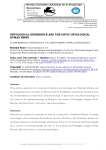
Ontological Experience and the Ontic Ontological Human Being
Статья научная
This article examines the concepts of Amrita and develops the Khechari Mudra one by integrating such concepts of Tibetan Tantric Buddhism and Hindu Tantrism with the developments of existential phenomenology. It goes from the phenomenology of the mind to the phenomenology of Being in the works of Heidegger, Eugene Fink, Maurice Merleau Ponty, and other phenomenologists.
Бесплатно

